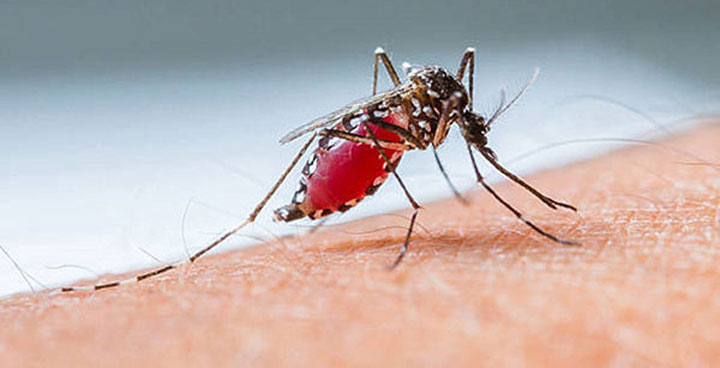By: Dr. Maryam Inayat

Another significant hazard is just around the corner when severe floods sweep through Pakistan, affecting more than 33 million people. Public health professionals are raising awareness of the growing threat of mosquito-borne illnesses like dengue spreading across the nation. In addition to the fact that Pakistan has been dealing with an increase in dengue infections, this year’s unusually early and strong monsoon rains have created ideal breeding grounds for mosquitoes.
What is Dengue?
As defined by the World Health Organization, Dengue is a mosquito-borne viral disease carried by female mosquitoes, mostly of the species Aedes aegypti and, to a lesser degree, Ae. albopictus. These mosquitoes can transmit the Zika, yellow fever, and chikungunya viruses. The risk of dengue varies locally depending on local climatic, socioeconomic, and environmental variables, which are both common in the tropics.
Except for when it is transmitted from a pregnant woman to her unborn baby, dengue is not contagious from person to person. The initial infection normally has modest symptoms, but if you develop second infection with a different strain of DENV, your chance of serious problems increases.
What brings about dengue fever?
One of the four dengue viruses is what causes dengue illness. The dengue virus may enter your blood and multiply when a mosquito biting you transmits the disease. You may feel ill due to the virus itself and the immune system’s reaction.
The virus can damage blood components that help you create clots and give your blood vessels shape. Internal bleeding may result from this, combined with certain immune system-produced substances, causing blood to flow out of your vessels. This results in the severe dengue symptoms, which can be fatal.
Can you develop immunity against dengue fever?
Yes, after contracting the virus, you can develop immunity to a particular strain. This is rather hard because there are at least four different strains of the virus (DENV). Your immune system has tools available to it that it could utilize to identify illnesses and improve at warding them off. Your body searches its toolbox while it battles a virus to identify the tool (antibody) that can neutralise that specific threat.
Each hazardous intruder to your body is specifically targeted by an antibody, which binds to it like a key does to a lock. Your immune system eliminates the target after antibodies cling to it. You are unlikely to get that particular virus again once your body has learned how to resist it.
You shouldn’t be able to contract one of the four strains of DENV once you have. However, other versions don’t fully suit that strain’s antibodies as well. Therefore, if you subsequently contract a different strain of DENV, it may be able to fool your immune system by using this inadequate match (antibody-dependent enhancement).
The new strain can be drawn into your cells by the antibody against the original strain you had, but for unclear reasons it is not eliminated. It then enters your cells without your cells being aware of its danger. As a result, the virus can more easily infect you and lead to more serious sickness.
What symptoms appear in dengue fever?
The majority of dengue infections are symptomless. High temperature (104°F/40°C) is usual if you do experience symptoms, accompanied with Rash, extreme discomfort behind your eyes, sickness or vomiting, joint, muscle, and bone discomfort.
The first signs of dengue fever begin four to ten days after a mosquito bite and remain for three to seven days. After their first symptoms start to wane, around 1 in 20 dengue patients will develop severe dengue.
Severe dengue (dengue hemorrhagic fever):
A life-threatening progression of dengue symptoms is considered severe dengue. Typically, 24 to 48 hours after your fever goes gone, you’ll start to see warning symptoms of severe dengue.
 A medical emergency, severe dengue can be lethal. If you have any of the following symptoms and have dengue or reside in a region where dengue is prevalent, visit the closest ER very once. The symptoms may include abdominal discomfort, often throwing up, having blood in your vomit or in your faeces, bleeding gums or a runny nose, extreme drowsiness, agitation, or restlessness.
A medical emergency, severe dengue can be lethal. If you have any of the following symptoms and have dengue or reside in a region where dengue is prevalent, visit the closest ER very once. The symptoms may include abdominal discomfort, often throwing up, having blood in your vomit or in your faeces, bleeding gums or a runny nose, extreme drowsiness, agitation, or restlessness.
How is the dengue fever diagnosed?
Blood tests are used to diagnose dengue disease. In order to check for dengue virus, your healthcare professional will draw blood from you and send it to a lab for analysis. Additionally, this might tell you which of the four versions you have. A blood test might be used by your doctor to check for additional infections that cause comparable symptoms.
In what ways is dengue fever treated?
Dengue fever cannot be treated with medication. Your physician will advise you on how to treat your symptoms and whether or not you need to visit the emergency room.
How can I treat the dengue fever symptoms?
The sole method of treating dengue fever is to cure your symptoms. Pay attention to your doctor’s advice, which may include consuming plenty of water and other drinks to stay hydrated, get as much sleep as you can, using just acetaminophen, such as Tylenol, to treat pain. Take no aspirin or ibuprofen. Your chance of internal bleeding that might be fatal may increase as a result.
How can I lower my chance of getting dengue fever?
Avoiding mosquito bites and being vaccinated are the two major strategies to safeguard against dengue.
Protection against Mosquitoes
The greatest strategy to lower your chances of contracting dengue fever is to avoid being bitten by mosquitoes. Use insect repellents that are EPA-registered and include 20% to 30% DEET or other compounds that are proven to help deter Aedes mosquitoes. Outside, cover any exposed skin, especially at night when there are more likely to be mosquitoes. Eliminate any standing water (boilers, birdbaths, and old tyres that may retain rainfall) and fill any low areas where water may collect. By patching screen gaps and, if you can, keeping windows and doors closed, you can keep mosquitoes out of your house.
In places where dengue is prevalent, use mosquito netting at night. If at all possible, stay away from visiting dengue-prone areas if you’re expecting. When travelling, be sure to contact the CDC to find out if there are any disease outbreaks in the area before you arrive.
What can I expect if I have dengue fever and its duration?
The majority of dengue fever infections have minor or no symptoms, but occasionally a more serious case can develop that need prompt medical intervention. The initial dengue symptoms continue for three to seven days. After this, the majority of patients start to feel better, but others have severe dengue that is life-threatening and has to be treated in a hospital.
Sustainable approaches and measures
It is both necessary and possible to find solutions to lessen the consequences of these climate-related problems. A reduction in mosquito breeding grounds and possibilities for human-mosquito interactions can be achieved by investments in urban planning, infrastructure, and home design.
The threat posed by mosquito-borne viruses must be moved up on the priority list of national and international health organisations. Strengthening monitoring to identify mosquito and virus incursions into new regions, equipping health systems to diagnose and manage these infections, and implementing sustainable and evidence-based methods for mosquito control and disease prevention must all be prioritised.
New technologies are required to stop the spread of dengue, along with increased efforts to reduce mosquito populations using existing methods of chemical control and environmental management. With Indonesia becoming the first nation to get a new dengue vaccine licenced for use in both children and adults, a significant milestone was recently attained. Over the past ten years, this self-sustaining, secure, and reasonably priced technique has been used to reach more than 10 million individuals in 11 countries, and several field tests have shown that it is successful at containing dengue.
The World Health Organization announced the Global Arbovirus Initiative in March 2022 in response to the urgent need for coordinated and long-term initiatives to eradicate dengue and other viruses spread by mosquitoes. The time for action is now to address the root causes of climate change and to support communities and governments in implementing evidence-based tools for controlling dengue and other mosquito-borne diseases. There is ample evidence that climate change is hastening the emergence and spread of these viruses.
The writer is a Doctor by profession and can be reached at [email protected]
